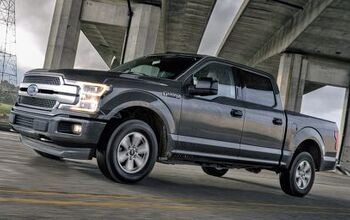QOTD: Priced Out of Pickups?

Twitter — or as I like to call it, the unintellectual dark web — regularly tosses out scorching takes like “too many people drive pickups” and other gold-plated nuggets for the online punditry to seize upon. Maybe there’s some truth to them.
But until government apparatchiks start barring dealership doors, saying, “Hey! You there — you with the cash that you worked hard to earn. Don’t you dare purchase this pricey domestic product for your own (completely legal) use!” we’ll continue buying them. Meanwhile, a good many people will look at the state of their finances, take a gander at rising ATPs in that segment, and decide on something else.
Are you a truck owner with a mind to downsize?
Yes, this has everything to do with last week’s study of existing and former truck owners. In the former camp, 68 percent felt trucks are overpriced for what you get, and 17 percent of this particular crowd claims they’ll look outside the segment come trade-in time.
The thing about trucks is that they can basically be anything you want them to be. Four-door family car. Stripped-down work hauler. Hunting 4×4. Brodude sports wagon. With the new Jeep Gladiator’s appearance, they can even take the form of a fun-in-the-sun convertible.
A sedan, despite its virtues, can never fill all of those shoes.
It’s no wonder that truck sales continue to climb, though at a slower pace — and at lower volumes — than their rampaging SUV/CUV rivals. The average transaction price of a full-size pickup last year was $47,400, up from $39,805 six years earlier — a climb we can partly blame on the myriad of profit-seeking ultra-lux trims. Trims one needn’t choose if their needs fall squarely in the big utility/basic transportation camp.
Ram will happily sell you a stock 1500 Classic Tradesman 4×2 for an after-destination price of $29,090 if roughing it is your bag. Its V8, quad cab new-generation sibling stickers for $34,885 if towing power, a backseat, and boosted refinement is something you demand of your truck.
Still, nicely appointed, reasonably glitzy pickup trims can’t be had for anything close to the $28,920 ATP of a compact crossover. And the burgeoning midsize pickup scene doesn’t seem to offer the buyer much in the way of up-front value (resale value, perhaps).
Everyone’s needs are different, and each of us draws funds from a very different bank balance. If you’re a current pickup owner, do you plan to remain so until your kid (or the state) takes away the keys? If you don’t, does price have anything to do with your decision?
[Image: Fiat Chrysler Automobiles]

More by Steph Willems
Latest Car Reviews
Read moreLatest Product Reviews
Read moreRecent Comments
- Corey Lewis It's not competitive against others in the class, as my review discussed. https://www.thetruthaboutcars.com/cars/chevrolet/rental-review-the-2023-chevrolet-malibu-last-domestic-midsize-standing-44502760
- Turbo Is Black Magic My wife had one of these back in 06, did a ton of work to it… supercharger, full exhaust, full suspension.. it was a blast to drive even though it was still hilariously slow. Great for drive in nights, open the hatch fold the seats flat and just relax.Also this thing is a great example of how far we have come in crash safety even since just 2005… go look at these old crash tests now and I cringe at what a modern electric tank would do to this thing.
- MaintenanceCosts Whenever the topic of the xB comes up…Me: "The style is fun. The combination of the box shape and the aggressive detailing is very JDM."Wife: "Those are ghetto."Me: "They're smaller than a Corolla outside and have the space of a RAV4 inside."Wife: "Those are ghetto."Me: "They're kind of fun to drive with a stick."Wife: "Those are ghetto."It's one of a few cars (including its fellow box, the Ford Flex) on which we will just never see eye to eye.
- Oberkanone The alternative is a more expensive SUV. Yes, it will be missed.
- Ajla I did like this one.


































Comments
Join the conversation
The only story here is the explosion of the Cadillac trims and that's a win all around. Luxury truck profits are keeping the lights on in Detroit. Luxury buyers have better options than they did before. And all of the platform development money that they put in for the banker trims has made the XLTs for working people better too.
I bought a new 2012 Chevy WT V6 2wd 2dr - "El Strippo" for about $22K including tax. Standard cab, short bed. Crank windows, manual door locks. AM/FM radio, no CD player. An excellent value. No problems with anything. I have 50K miles on it after 7 years, should be reliable until it hits 15 yo or 180K miles, whichever comes first.